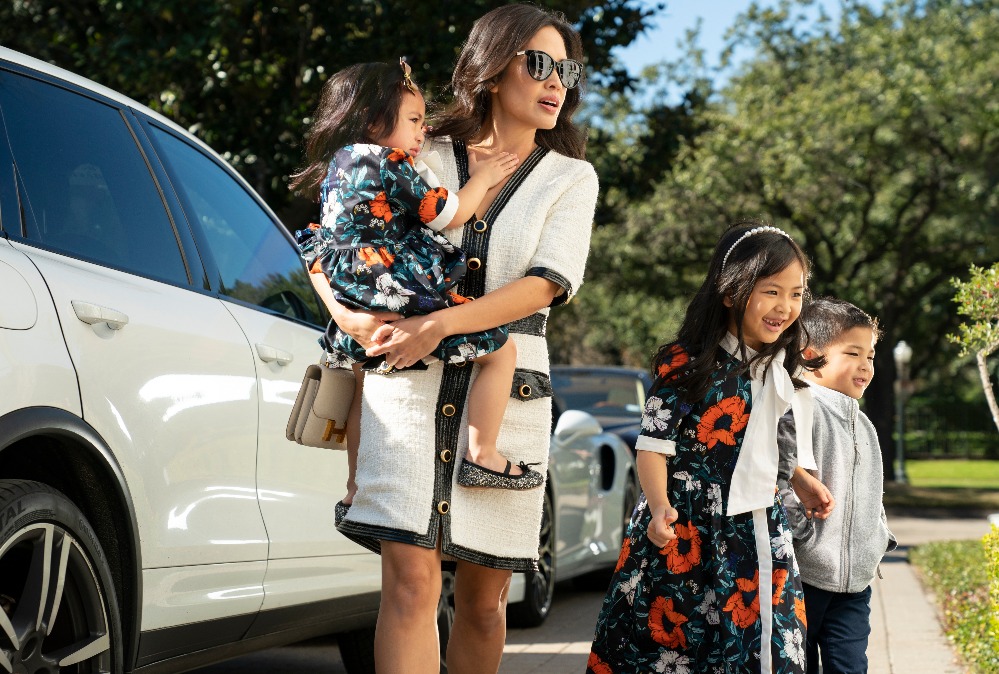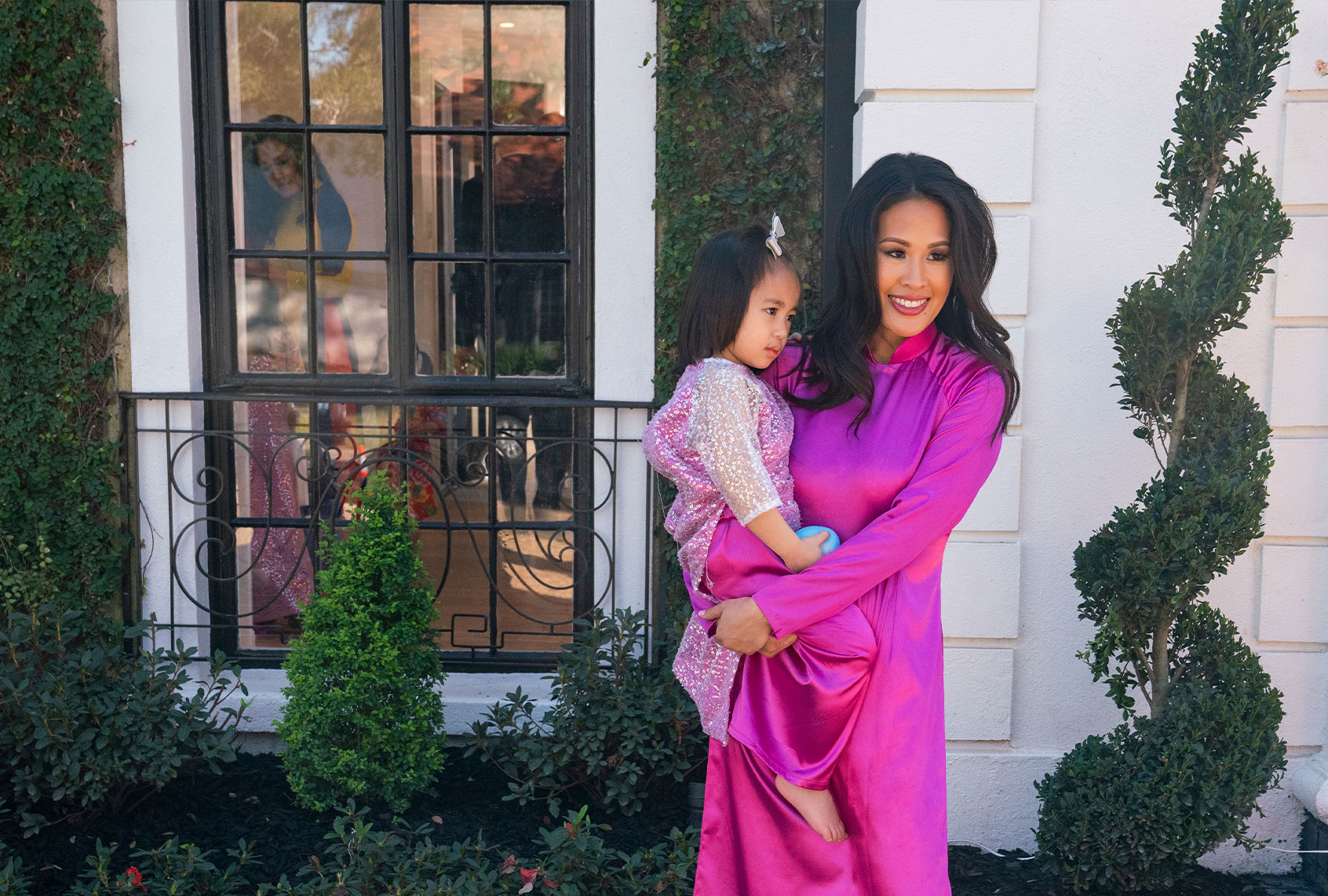Judy Ho has been letting her parents down since she was born, just by being female.
“My family is Vietnamese but loves being American. My brothers are named Washington and Reagan,” she says in a trailer for HBO Max‘s new reality series “House of Ho.” “I was a disappointment ’cause I was a girl . . . so I’m named Judy.”
Such favoritism is an open and accepted part of patriarchal Vietnamese culture. As my cousin once told me: “Men are the head of the household; women are the neck.”
And that appears to have been the intended structure for “House of Ho,” HBO Max’s Vietnamese American answer to the Kardashians. Judy’s younger brother Washington was the one producers heard about and approached first, and it’s easy to see why. He has all the makings of a colorful reality show character – a rich and feckless wastrel given to sporting designer sunglasses and smoking jackets while partying in Houston’s tony neighborhood of River Oaks.
“House of Ho” isn’t necessarily unique in the “rich folks” docusoap genre, but it’s the first to show an American family of Southeast Asian descent and everything that entails – from sibling rivalries and going Christmas shopping to wearing the traditional áo dài and celebrating the Lunar New Year. It’s also a relief to watch a show about Vietnamese people that isn’t an outsider’s take on the trauma of the Vietnam War. Take a look at the trailer below:
Washington looms large in the center of the “House of Ho” poster, flanked by Judy and his wife Lesley. He’s the guy who speaks up the most in a Q & A for the show’s premiere. He’s also the one publicists were pitching to me for an interview. (As a second-generation Vietnamese daughter who also has two brothers and grew up in Houston, I decided to speak to Judy instead.)
“Washington got me to sign on to this because he said the show was about him, and I was just gonna be in the background,” Judy said in an interview with Salon.
Even though she’s the firstborn child, by virtue of his gender Washington is the heir to the family’s Texas banking and real estate business, which was built up by immigrant parents Binh and Hue from nothing.
“Washington’s the golden child, he’s the oldest son. It’s up to him to carry on the legacy. I’m just there to support him,” she continued. “That’s just something that I’ve grown up with, that’s how my mom was with my dad. My parents are very conservative, very Catholic, Vietnamese, very traditional. I’ve internalized all this.”
Ho money, Ho problems

“House of Ho” key art (HBO Max)
As advertised, the show is filled with sequences of the Ho family living in luxury, spending freely, and hopping private jets. The theme song even boasts, “I’ve got three commas in my bank account.” However, it becomes apparent that while the older Ho family members are happy with their American dream, their children are caught in a generational struggle that they still haven’t quite resolved, partly because of differing values and partly because of dependence on their parents’ wealth.
In the first episode, Judy announces her intentions to divorce, which does not go over well with her parents and fuels a season-long conflict of stubborn silences and outright denials.
“It’s hard to balance the more American modern ideals that we see on TV and the way we grew up. And our parents – they’re still thinking we’re back in Vietnam,” said Judy. “My dad, whatever he says goes, even to this day. You can see the way he talks to me and his expectations of me. So when I was going through divorce, to him I was a disappointment.”
When Judy broaches divorce, this act of autonomy is challenging the expectations and values instilled in her. But there’s even more at play here. Acknowledging problems in a culture that does not speak about uncomfortable feelings is bad enough, but the ultimate taboo is to speak about them publicly. To use the filming of a reality show to break one’s silence and work through longstanding issues? That’s radical.
“At that point in my life, I was in a very unhappy marriage. I was about to turn 40, I was contemplating divorce, and the show happened to be filming at the same time,” said Judy. “I felt like once I committed to the show, I was like, ‘I have all these emotions that have been bottled up and I just want to let it out.’
“In this next chapter of my life I didn’t want to live in fear of my parents anymore. They just have to believe that I’m not doing this lightly, that I’m thinking of my future. I have my own children. Now I have a duty to them,” she said. “It was really scary. Even watching that scene when I tell them, I see my mom crying, and I feel it again.”
There’s one more factor that makes Judy’s rebellion significant: financial security. In the past, her father has used money to control her actions, and when Judy defies him about the divorce, she doesn’t have a safety net. Judy had quit her job so she could raise her three children with the intent to begin working again as a lawyer specializing in title insurance and real estate.
“That was my plan,” she confirmed. “Once they started school full time, I thought I’d go back to work. My youngest one just started full time school this past fall, but obviously with coronavirus, if I started working and then going back home where they’re in quarantine, it would just be too hard.”
Instead, the divorce made her reliant on her parents again – first to accept the house that her father had built for her, and then for income during the pandemic while she acted as daycare for her children and her nieces and nephews.
To have and to Ho . . .

Lesley Ho in “House of Ho” (HBO Max)
Judy had fulfilled a role that is unique to the Southern Vietnamese family: chị hai, the oldest sister. It’s a dubious honor – not really one of respect but of responsibility – essentially acting as a second wife and mother. By marrying, Judy was able to trade this role for running her own household.
That vacancy, however, was filled by Washington’s beleaguered wife Lesley, the second sympathetic character on “House of Ho.” Not only does she work full time as a pharmacist from home, but she raises their two children, coddles Washington, and takes on the duties he can’t seem to handle. There’s a telling scene in the kitchen when she discovers that he’s done nothing to plan his father’s retirement party, and she reluctantly shoulders the duty even though she’s already stretched to her limits.
“When he married Lesley, she took on that burden for me. I’m very grateful for that,” said Judy. “And she has a lot of pressure from my parents. It’s hard being their daughter; I can’t imagine being their daughter-in-law because expectations are even higher, especially because she’s married to Washington. So she is expected to pretty much be like my mom.”
The treatment Lesley endures from her in-laws is tantamount to gaslighting. On the show whenever Washington and Lesley fight – usually over some duty that he’s shirked or spending money he doesn’t have – he runs to his mother. Instead of setting him straight, she’ll chide Lesley to do more for Washington, like cook for him, or to take calming herbs so that she’ll talk less.
The ultimate example of how she’s burdened instead of Washington occurs when she shows Binh the ballroom of the St. Regis Hotel, the proposed venue for his retirement party. It’s at that moment that he reveals he’s not ready to retire yet because he feels his son is too immature. But he can’t tell his son this directly, so Lesley is weighted by this secret until she finally breaks it to her husband.
“I understand why my dad did that. It’s hard for my parents to talk to us directly,” said Judy. “If they want a message to get to my brother, they’ll tell me, and I funnel it over. It kind of softens it, you know what I mean? He knew that if he told us directly, there’ll probably be tears and there’ll probably be some anger, resentments that would be coming out. So I felt like by telling Lesley, that would kind of soften the blow.”
For Washington. Lesley, however, is deemed strong enough to take that blow.
It’s this kind of convoluted behavior that shows just how bold Judy’s move to confront her parents head-on was. In a way, the show was an ambush for Binh and Hue, who thought they were participating in a documentary about achieving the American dream. Instead, they got rebellious children talking about messy feelings . . . in public!
Washington certainly has an easier time dealing with his parents than his sister or wife do, but perhaps it’s been too easy. As the golden child, he could do no wrong – but this backfires on the show when he tries to get his alcoholism under control. While his sister and wife support his sobriety, his parents and aunt would either deny there’s a problem or continue to offer him alcohol.
A Ho by any other name . . .

Judy Ho and her children in “House of Ho” (HBO Max)
It’s clear that names are meaningful for the Ho family. That surname holds weight in Houston’s Vietnamese community, and the show emphasizes it featuring episodes with cheeky titles such as “Ho Sweet Home” and “The Big Four-Ho,” among others. That external label is as much a part keeping up appearances as it is the family’s identity.
The same could be said about the practice of using presidential monikers, which continues for the next generation. In an act of filial piety, Judy named her three kids according to the new American Ho tradition: Kennedy, Truman and McKinley. Washington’s kids are named Lincoln and Roosevelt – making three-quarters of Mount Rushmore. (When asked about how much the family members differ politically, Judy said, “We all have different opinions, especially in the last election. After a while, my mom tells all of us to be quiet.”)
As for youngest brother Reagan, who’s unmarried and therefore without offspring to inflict such names, there’s a reason he’s not an active part of the show.
“Reagan was very adamant: ‘I’m not gonna be a part of this. This is not what I want to do,'” said Judy. “He’s the opposite of Washington. He’s in jeans and a t-shirt. He’s out hunting and fishing in his big old truck with a mud all over it – a Texas kind of cowboy.
“I feel like he has less pressure. He’s not chị hai; he’s not the oldest son. So I feel like he’s been allowed to be a little bit more independent and not follow the family line. And he’s never been afraid to speak his mind when it comes to my parents. That’s why I respect him because he’s always lived his life the way he thought was best for him.”
Characterizing “House of Ho” as feminist or thumbing its nose at patriarchal practices may be an overstatement. But how the problems were addressed on the show – and the subsequent resolutions – certainly feels more transformative for its participants than for most in the docusoap genre.
A year after beginning the project, Washington is still sober, the Ho parents are being more proactive about their relationships with their children, and Judy’s new relationship with Dr. Nate Nguyen – who proposed to her in the season finale – is still going strong. Seeing how much good was accomplished by accepting the show’s format that encouraged openness, Judy is eager for a second season.
“I bet you if we [hadn’t done] the show my parents would still asking me to go back to my ex at this point. The fact that I was open about my new boyfriend – I can’t tell you how many years of my life I’ve wasted hiding that I was dating someone,” said Judy. “If there is a Season 2 hopefully there’d be a wedding. And I also would like to show a trip back to Vietnam with the whole family.”
Despite all the drama, ultimately Judy is proud of who she is . . . even if she’s not named after a president.
“I’m named after the lady who sponsored my family to America and taught them English to help them start their life here. So obviously, I was named after someone who is very important to them,” she said.
As for marriage, Judy doesn’t see herself taking on Nate’s last name.
“I’m very proud to be a part of my family. I’m proud of everything my parents have achieved and everything that we are showcasing in the show, I will always be a Ho.”
“House of Ho” is currently streaming on HBO Max.

